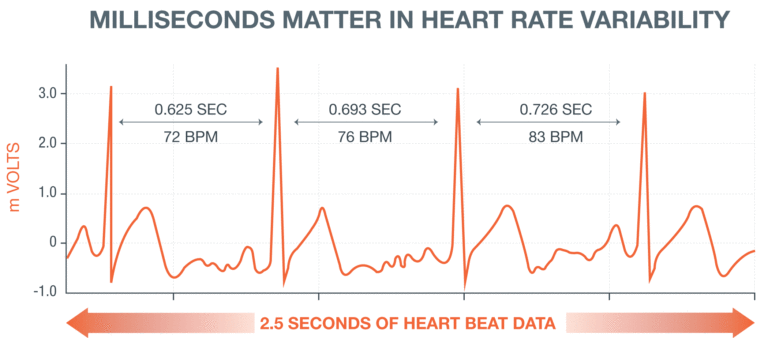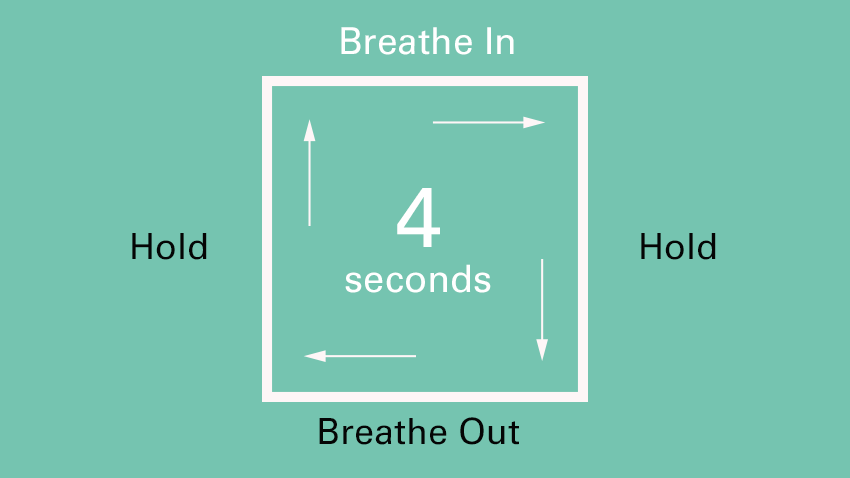How to Use HRV to Manage Stress
Measure your HRV | Experiment with breathing exercises | Take a cold shower | Use adaptogens to cope better with stress | Train your HRV
Sometimes chronic stress is difficult to avoid: think of social and financial stress, emotional trauma, work pressure or illness. Yet it is possible to strengthen the resilience of body and mind to this stress, and in two ways:
- Change how you experience mental stress.
- Reduce other sources of stress, such as diet, sleep, too little or too much exercise.
HRV (Heart Rate Variability) is the variation in time between heartbeats. It is a well-known marker of sympathetic and parasympathetic activity and is used by astronauts and Olympic athletes to measure stress and recovery.
In this blog you will read about the relationship between HRV and stress and that an HRV measurement is a useful indicator of how stressed you are. We have also collected a number of tools for you that you can use in a period that you experience stress.
Measure your HRV
Interestingly, the heart does not beat at a constant speed. The greater this variability, the more you are "ready" to perform at a high level - be it cognitively, physically or socially. A stressed heart, on the other hand, has a very constant rhythm: your HRV will be low.
In essence, a high HRV is good (90 is ideal), a low HRV (below 60) is not so good.
Your HRV is therefore a good indicator of whether you are stressed, sleep-deprived or have not yet fully recovered from the previous day's exertions. [*] By measuring HRV, you know whether or not you should embark on a strenuous activity: such as a solid workout or working extra hours.
In fact, managing stress is about managing HRV. Apart from getting enough rest both physically and mentally, for example through quality sleep, there are a number of tools you can use to improve your HRV. [*]

Experiment with breathing exercises
Meditation and mindfulness help increase HRV [*], but if you don't feel up to it or think it would take up a lot of your time, you can achieve the same effect with a breathing exercise. We give you two exercises that are almost impossible to do wrong and easy to apply.
&&&&&
Alternate Nostril Breathing
This is a very simple exercise in which you alternately close one nostril with each inhalation and exhalation. First, find a quiet place where you will not be disturbed. Sit up straight and close your eyes. Block your right nostril with your right thumb and inhale for a few seconds, then remove your thumb and block your left nostril with the first two fingers of your right hand while exhaling. Repeat 10-12 times, or longer if you wish.
Box breathing
Another successful breathing exercise recommended by HRV experts to increase HRV is box breathing. It was made famous by Navy Seals, who use it when they need to concentrate in high-pressure situations. The exercise is as follows: Close your mouth and inhale slowly through your nose for four counts. Hold your breath for four seconds. Then exhale slowly through your mouth for four counts. Hold the exhalation for another four counts. Repeat! [*]

Take a cold shower
Exposure to cold, from an ice bath, cold swim or cold shower has been shown to improve heart rate variability, [*] and in different ways:
Exposure to cold allows your body to recover more quickly from an overloaded state. If you have had a heavy workout the previous day, a cold shower reduces inflammation and promotes recovery. Your HRV will therefore improve more quickly. [*]
We already started the blog with the fact that HRV is a marker of sympathetic and parasympathetic activity, derivatives of the autonomic nervous system. An increase in sympathetic activity indicates stress, thus a low HRV. An increase in parasympathetic activity is a result of rest and linked to a high HRV.
The moment you stand under a cold shower or sit in a cold bath is a stress factor for the nervous system, but after you get out, sympathetic activation decreases and shifts to increased parasympathetic activity. [*]
Finally, due to a boost in endorphins (the happiness hormone), you also experience a reduction in pain and stress after regular exposure to cold. [*]
Use adaptogens to function better under stress
The body is always looking for balance and tries to adapt itself when this balance shifts due to stress or fatigue. Adaptogens, like Rhodiola and Panax ginseng, help your body adapt to a changed situation. You can use them during physically or mentally strenuous or stressful situations. [*], [*]
How can you measure HRV?
There is different tech on the market that allows you to measure your HRV:
Using these kinds of tools is a good way of finding relationships between what you do during the day and the effect on HRV. Your HRV is very individually determined. Also the effect of training, eating, drinking coffee and alcohol differs from person to person. Measuring is knowing!
You can also train your HRV
Heartmath's Inner Balance Trainer is an excellent tool for training your HRV. It is an app that is linked to a heart rate monitor which you attach to your ear. This gives you immediate feedback on your HRV. By applying the right breathing technique, you can improve your HRV. The more often you train this, the better you will learn to feel whether you are stressed or not. At that moment you can influence your stress with your breathing. By improving your HRV with your breathing, you give your brain a signal that makes you feel calmer. So your HRV influences your brain and vice versa.
Take Away
Functioning better under stress starts with measuring your Heart Rate Variability (HRV). A high HRV means that your body is ready for a mental or physical effort. With a low HRV your body has not yet recovered from a stressful activity and you will have to take it easy that day. In this way you can be sure that you are not physically or mentally over-stressed.
Do you measure a low HRV, but still have a deadline to meet? Experiment with breathing exercises or take a cold shower. Both reduce stress and result in an improved HRV score. A quick win is to take adaptogens. They make your body adapt to a stressful situation, so it can better cope with the stress. For the long term, you can also train your HRV with Heartmath's Inner Balance Trainer.




